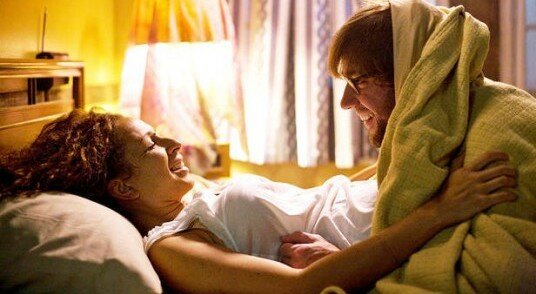With past trophies like American Beauty and Revolutionary Road, a film by Sam Mendes has a statistically significant probability of transcending the realms of cheap laughs and light-hearted fluff. So you can imagine my surprise when Away We Go wasn’t a black hole of jaded cynicism and suburban disillusionment.
If anything, it was warmly funny and an interesting exploration of modern fears and hopes surrounding family, love and identity. It follows the journey (read: roadtrip) of a thirty-something American couple, Verona De Tessant (Maya Rudolph) and Burt Farlander (John Krasinski), who set out to find their uniquely own place to nest as they expect their first child. Along the way, they reconnect with a motley collection of friends and family, who show them what their life together could be but predictably enough, what their lives won’t be.
This is one of those films where, if you try to superimpose another Mendes film onto it, you come out feeling overwhelmed by a sense of disappointment. Where is the brooding anguish? Where is the angst and self deconstruction? Quite frankly, this is not a bleak film. Even if the writers (Dave Eggers, Vandela Vida) managed to suffuse some degree of introspection and social commentary into the story, every substantial message is glossed over. And then liberally sprinkled with Splenda®. I don’t mean to say that Away We Go is a “happily ever after” but the ending is all-together very tidy. Personally though, I prefer this to the alternative (a bespectacled, divorced, alcoholic Krasinksi who sporadically throws Tupperware at his emotionally stunted offspring).
Although Mendes may have aimed for something a little bohemian and mellow, there is something hyperbolic about the cheerfulness of the whole film. For those whose palate leans towards the subtle and understated, this film will probably elevate your blood pressure. There was a whole cache of expectant pauses strewn about the film, especially after an emotive scene (where the characters stare pensively into the darkness of their cardboard-windowed abode) or after a punchline (“shit, I just gave my guy’s brain a vulva” – delivered deadpan and with uncanny skill). While not as bad as canned laughter that many sit-coms resort to, these little pockets of silence annoy. It’s as if the film supposes that the audience is too thick to understand the intended message that they need to be prompted.
Something similar can be said of the characters in the film, especially those encountered along the way. They are all exaggerated stereotypes of American families; the socially retarded wife with questionable parenting ability and her disengaged and paranoid husband, the career-driven girlfriend who doesn’t really like her boyfriend but likes what her boyfriend represents, the wannabe hippies who condemn strollers, the couple who have a buzzillion adopted kids but are still crippled by their multiple miscarriages, and a newly divorced dad. I suppose the crux of what irked me was the sense of contrived authenticity – as if the stereotypes weren’t just that, but the real thing – dissected and waiting to deliver epiphanies to the masses.
![away_we_go22[1] away we go221 258x263 custom Away We Go (Review)](/wp-content/uploads/away_we_go221-258x263-custom.jpg)
|
Having just emptied my spleen about Away We Go, let me make my disclaimer here. I still think this is a beautifully constructed film. The cinematography was sublime (especially a scene where the planes flies past the reflective glass panels of a skyscraper and looks like a dolphin leaping in and out of the sea – I’m sure there’s some symbolic meaning to be found there but I just liked its visual chutzpah). As for the performances, it was great to feel the affection and intimacy between Verona and Burt. Rudolph and Krasinski did a marvellous job pulling off that easy, comfortable companionship often glimpsed solid relationships. Even if the humour was a little deliberate (“did you read the itinerary? I stapled it to your jacket”), most of it was still very intelligent and had the obligatory measure of quirk. And a knockout performance goes to Maggie Gyllenhaal, whose portrayal of the hideously fanatical doped-up hippie mum LN (apparently some “alternative” expression of her name), was nothing short of fantastic. And the use of different locales (Phoenix, Tuscon, Madison, Montreal and Miami) to reflect the various types of families was also well used and striking.
So my advice? Forget your neuroses/cynicisms/film-critic hauteur and enjoy the film for the light-hearted morsel of fun it’s intended to be. And get popcorn.
















